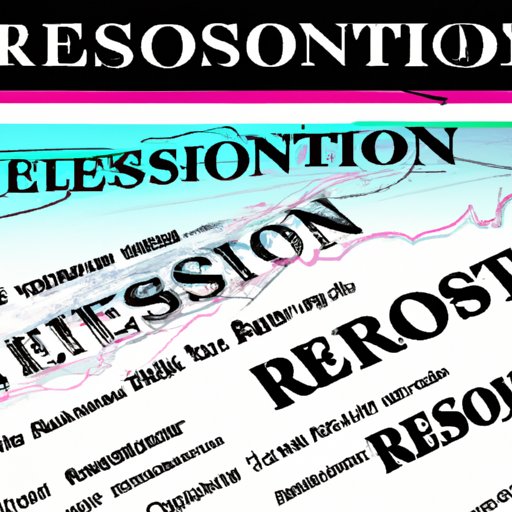Introduction
The global economy has been shaken by the recent outbreak of the COVID-19 pandemic. With social distancing measures and lockdowns implemented around the world, many businesses have experienced a sharp decline in demand and revenue. As a result, many countries are facing an economic recession.
But what is a recession? According to Investopedia, a recession is defined as “a period of temporary economic decline during which trade and industrial activity are reduced, generally identified by a fall in Gross Domestic Product (GDP).” In other words, a recession is a prolonged period of economic contraction, typically lasting more than two consecutive quarters.
So with the world now firmly in the grip of a recession, it’s important to understand how to best invest during this time. In this article, we’ll explore the current economic situation and provide a strategy for investing during a recession, as well as highlight some potential opportunities that may arise in a recessionary economy.
Developing a Strategy to Invest During a Recession
When it comes to investing during a recession, it’s important to develop a strategy that takes into account the current economic climate. Here are three key strategies you should consider when planning your investments:
Identifying Recession-Proof Stocks
The first step in developing an investment strategy during a recession is to identify stocks that are likely to remain resilient even in a weak economic environment. According to a study from the University of California, Davis, stocks in industries such as healthcare, consumer staples, and technology tend to perform better during recessions.
Investors should also consider companies with strong balance sheets and solid cash flow, as these can help protect against market volatility. Additionally, dividend-paying stocks may provide a steady source of income during a recession.
Focusing on Long-Term Investments
While it can be tempting to try and time the market and take advantage of short-term opportunities, it’s important to remember that long-term investments are key to building wealth over time. As Warren Buffett once said, “Only buy something that you’d be perfectly happy to hold if the market shut down for 10 years.”
In other words, investors should focus on buying quality stocks and holding them for the long term. This will allow you to ride out any short-term market fluctuations and benefit from compounding returns over time.
Researching and Analyzing Economic Data
Before making any investment decisions, it’s important to research and analyze economic data. By keeping an eye on macroeconomic indicators such as GDP, unemployment rate, and inflation rate, you can gain valuable insights into the health of the economy and make informed investment decisions.
It’s also important to pay attention to sector-specific data such as earnings reports and industry trends. This will help you identify which sectors are likely to be most resilient during a recession and which ones should be avoided.

Taking Advantage of Opportunities in a Recessionary Economy
In addition to developing a sound investment strategy, there are also several opportunities that may be available in a recessionary economy. Here are four key strategies to consider:
Investing in Companies with Strong Balance Sheets
During a recession, companies with strong balance sheets are likely to outperform their weaker counterparts. Companies with healthy balance sheets have access to more capital and are less vulnerable to economic downturns. Look for companies with low debt levels, high cash reserves, and strong operating cash flows.
Exploring Foreign Markets
Foreign markets can offer unique opportunities for investors during a recession. As the US dollar weakens, investors can take advantage of the currency exchange rate and buy foreign stocks at a discount. Additionally, foreign markets may be less affected by the recession than domestic ones, providing additional diversification benefits.
Refinancing Debt with Lower Interest Rates
Interest rates tend to decline during a recession, making it an ideal time to refinance debt. Consider taking out a new loan or refinancing existing debt with a lower interest rate, which can help save money in the long run.
Utilizing Tax-Advantaged Accounts
Tax-advantaged accounts like 401(k)s and IRAs can be a great way to save for retirement during a recession. These accounts offer tax benefits, allowing investors to defer taxes until withdrawals are made. Additionally, contributions to these accounts are typically invested in a portfolio of stocks and bonds, providing exposure to the stock market without the risk of losses due to market volatility.
Conclusion
Investing during a recession can be a daunting task, but with the right strategy and a bit of patience, investors can come out ahead. Focus on identifying recession-proof stocks, paying attention to long-term investments, researching and analyzing economic data, and taking advantage of the unique opportunities that may be available in a recessionary economy. By doing so, you can weather the storm and come out stronger on the other side.
(Note: Is this article not meeting your expectations? Do you have knowledge or insights to share? Unlock new opportunities and expand your reach by joining our authors team. Click Registration to join us and share your expertise with our readers.)
